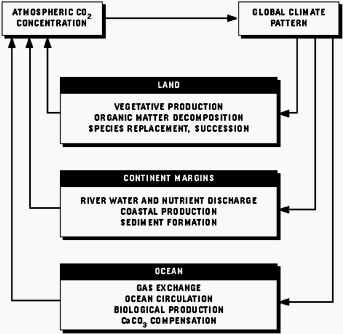


Changes in global climate due to increased atmospheric
CO2 will alter carbon cycle processes in land, continent margins, and oceans,
which will in turn affect the atmospheric CO2 concentration. Processes that may
have effects large enough to alter future projections of atmospheric CO2 are
listed under their geographic region.

Will future CO2-induced changes in temperature and precipitation equal or exceed the changes that have occurred over the glacial cycles of the past 160,000 years and affect the global carbon cycle?

Colder or wetter climate will favor the uptake of more CO2 from the atmosphere by the oceans, whereas warmer or dryer climate will decrease the uptake of CO2 by the oceans. The greatest uncertainty is how the gas exchange rate will vary with changes in surface winds under altered climate.
Periodic climate events such as the El Niño / Southern Oscillation produce detectable changes in vegetation dynamics and atmospheric CO2 concentration. The understanding of seasonal and interannual variation in global terrestrial vegetation dynamics is currently sketchy because of a lack of data to relate ecosystem processes to climate variation for most major biomes.
Field and laboratory experiments on tundra ecosystems that mimic the changes expected to occur as a result of climate changes reverse the direction of CO2 flux from a net storage of 150 g CO2 m-2 season-1 to a net release of 300-400 g CO2 m-1 season-1. Annual liberation of as little as 1% per year of either the 300 Pg C stored in the top meter of soils above the 60o latitude band or the estimated 500 Pg C in peat would double the current rate of increase in atmospheric CO2.

Post, W. M., F. Chaves, P. J. Mulholland, J. Pastor, T. H. Peng, K. Prentice, and T. Webb IV. 1992. Climate feedbacks in the global carbon cycle. In D. A. Dunnette and R. J. O'Brien (eds), The Science of Global Change. American Chemical Society, Washington, D.C.
Integrated Assessment Briefs. 1995. ORNL/M-4227. Oak Ridge National Laboratory, Oak Ridge, TN.